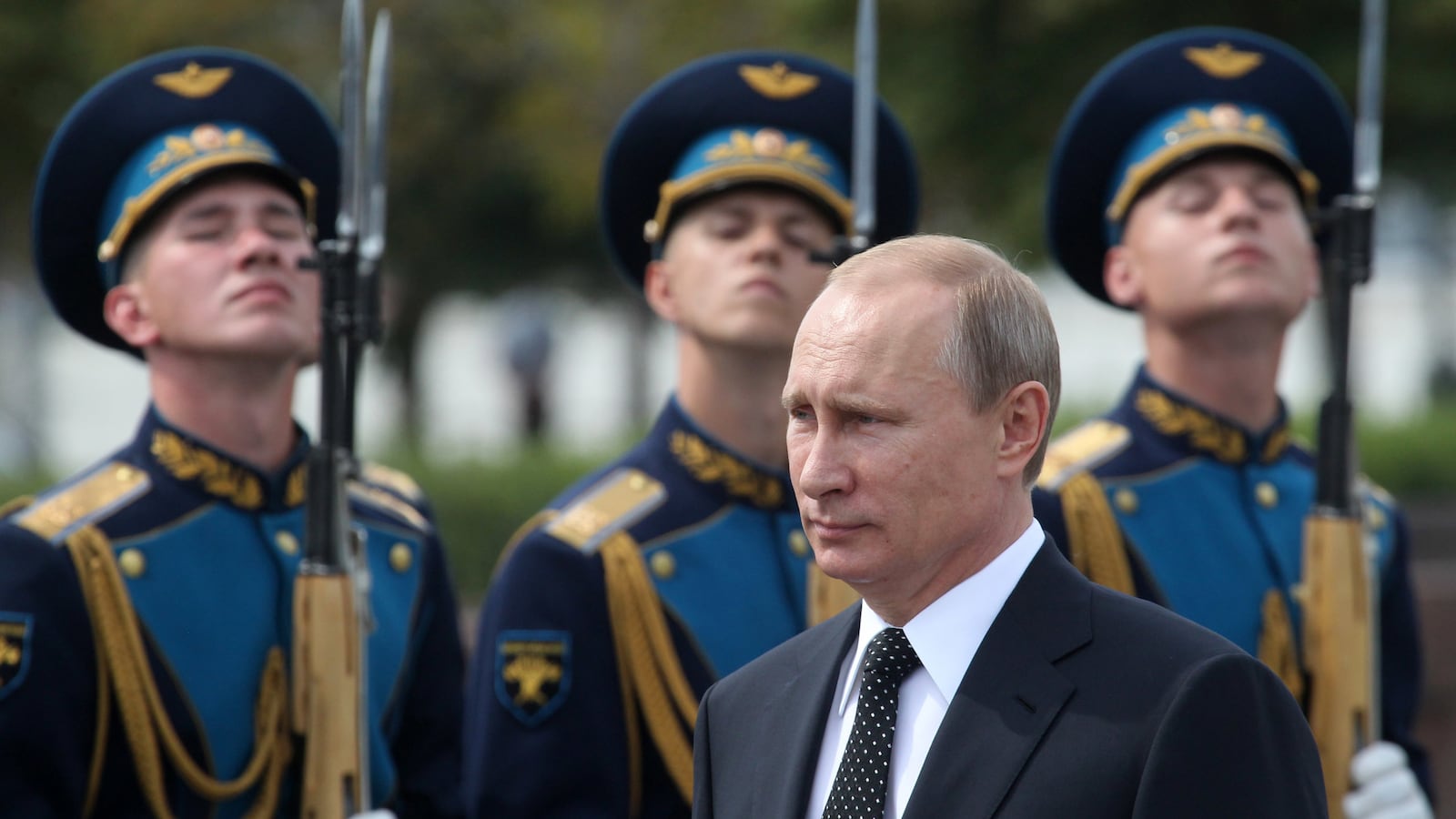LONDON, UK — Vladimir Putin is gripped by a deep hatred of NATO, an alliance he believes is hell-bent on belittling Russia. As he sits in the Kremlin plotting its destruction, however, his clumsy foreign policy maneuvers have achieved precisely the opposite effect.
After two decades of dwindling influence, NATO is refreshed and energized by the growing threat on its eastern flank. European member states, who neglected their commitments and watched from the sidelines as the United States kept the alliance on life support, have suddenly rediscovered the value of NATO’s collective strength.
World leaders and their entourages of advisers arrived on the south coast of Wales on Wednesday night with a clear sense of why NATO exists, a feeling that had all but ebbed away after a decade of miserable, bloody conflict in Afghanistan. “There has been an awakening,” a British defense official told The Daily Beast.
Since the collapse of the Soviet Union, the question of NATO’s purpose has been endlessly debated. Over the past decade, it has been little more than a hollow command and control structure subsumed by whichever U.S.-led “coalition of the willing” was engaged in military or peacekeeping operations somewhere else in the world.
At the start of the year, the NATO summit in Newport was expected to garner little interest, as it focused primarily on managing the drawdown in Afghanistan, a foreign adventure that had many governments vowing, “Never again.” The gathering now is being widely billed as one of most significant in NATO’s 65-year history. “Putin has revived NATO,” said Sir Christopher Meyer, Britain’s former ambassador to the United States.
In a rare joint article, President Obama and British Prime Minister David Cameron called on NATO to redouble its efforts in the face of Putin’s aggression. Writing in The Times of London, they said “Russia has ripped up the rulebook” by imposing its will over the sovereignty of a neighboring country “at the barrel of a gun.”
“When NATO last met in Britain in 1990 the Cold War was ending… many might have thought—even hoped—that a new era of peace and prosperity would make this great security alliance less relevant and less needed,” they wrote. “But the truth is that today NATO is as vital to our future as it has ever been in our past.”
Steven Pifer, who spent 30 years working on Russia and NATO at the State Department and the National Security Council, said it was high time the member states remembered why the North Atlantic Treaty was drawn up in the first place. “NATO has to take some steps that are designed to reinforce the Article 5 collective defense provision—and I think that effect is entirely attributable to Mr. Putin,” he said.
Under Article 5 of the treaty that established NATO, an armed attack against one of the alliance members is considered an attack on all of them. For the central European and Baltic states, that doctrine of collective defense has taken on an unexpected immediacy in the wake of Russian aggression in Crimea and beyond.
A new rapid response force of several thousand troops is expected to be approved at the summit while there are discussions about upgrading NATO facilities in Poland and establishing permanent military equipment in Eastern Europe that can be used by rotating military units.
While Western leaders would like to think NATO can help to defang Putin, acting in defense of non-NATO countries like Ukraine was never intended as the central thrust of the alliance’s remit, nor was assuming the role of the world’s policeman, with interventions like those seen in Kosovo and Libya.
“Afghanistan has cured most people of the desire to engage in large out-of-area activities, so without the events of the last seven or eight months between Russia and Ukraine, NATO would be confronting the question: What is the alliance’s purpose?” said Pifer, now a fellow at Brookings. “You now have very clear voices calling for NATO to refocus on its original purpose because there is a Russian threat of a kind that we haven’t seen for most of the last 20 years.”
While the Ukrainian president, Petro Poroshenko, is due to attend the Wales summit, there is no appetite within NATO to invite Ukraine to join the alliance. The era of expansion is over, to be replaced by an emphasis on ensuring the security of the existing members.
Jeffrey Donaldson, a member of Britain’s Parliamentary Defense Select Committee, said Britain and the United States were urging their European allies to match their newfound enthusiasm for NATO with increases in their military contributions.
“There’s no doubt that people took their eye off the ball in the post-Cold War era and felt that the need for defense spending had diminished,” he said. “The renewed Russian threat in Eastern Europe has given NATO a new focus on ensuring that we have the capacity to deal with military aggression. We need to develop a policy where our security approach matches our political approach.”
The Baltic states have agreed to increase their military spending in line with their NATO commitments, but major economies like Germany have no intention of upping their defense expenditure. Putin may have just guaranteed a new era of NATO relevance, but there is no imminent prospect of Europe picking up its half of the tab.






